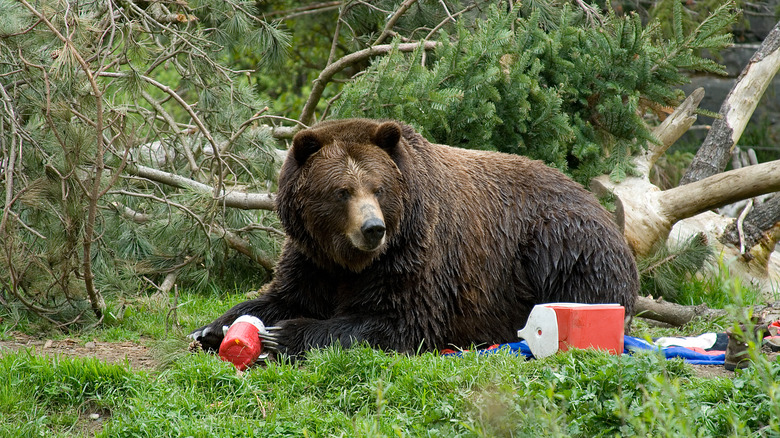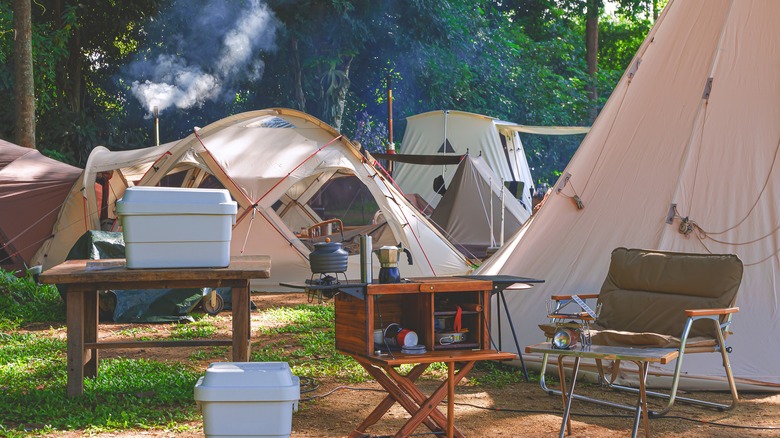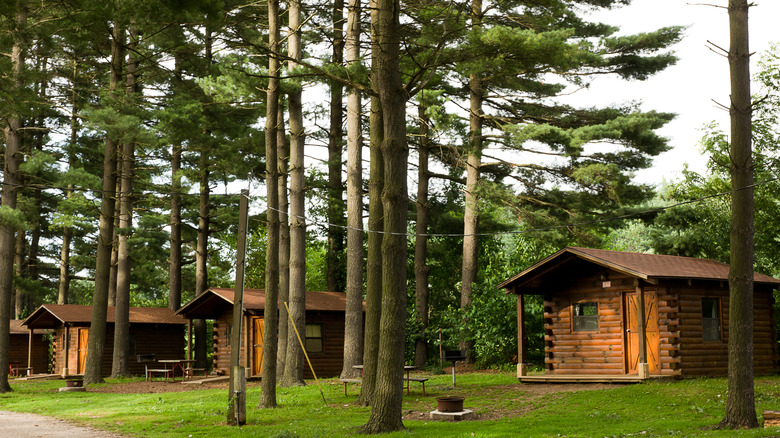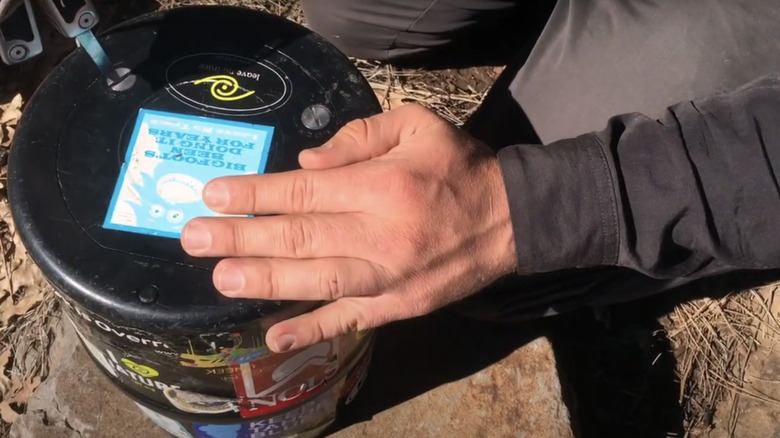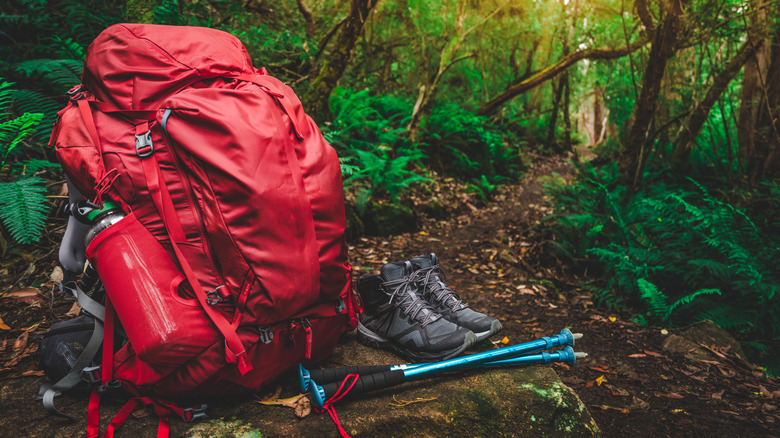The Correct Way To Store Your Food While Camping
When you are camping you will almost certainly see wildlife, which can be an exhilarating experience. However, that same encounter can be terrifying and even dangerous for animals and humans alike. As harmless as it may seem, leaving crumbs at your campsite or having a few snacks in your camp overnight can have devastating effects.
In order to protect the creatures that live in your favorite places to explore, you should always store your food correctly. Believe it or not, it could save a life. As described by Leave No Trace, the more often wild animals get food from humans, either intentionally or by accident, the more they associate people with their next meal. This encourages these animals to be bolder and less fearful when they interact with people. When those animals are bears, it is particularly dangerous, but encouraging any wild animals to approach unsuspecting people can lead to aggressive behavior. If an animal bites a human, it can be a painful and even deadly experience for both. They may spread disease to humans, and animals that have been in altercations with humans are often euthanized.
Food storage at campgrounds
During the day at your campsite, you will obviously need to get your food out of storage to prepare, serve, and eat it, but never turn your back on it. The smell of your food can attract wild animals quickly, and you don't want to leave it unattended to be eaten by critters while you aren't looking. When you're done eating, you should wash your dirty dishes right away and make sure not to leave any crumbs behind.
Overnight, you should never leave your food out or on the campground or in your tent. If it's allowed by the particular campsite you are camping at, you can just store your food inside your car. This is an easy and convenient method, as long as you tuck it all out of sight and keep the windows rolled up all the way. At other campsites, storing food in your car may not be allowed. In many cases, these campsites have food lockers that you can use instead. These are large metal boxes which even a bear is unable to break into, that work very well as long as you make sure to close them all the way and secure the latch.
Storing food when staying in a cabin
In a tent cabin, you will have to store your food in designated food lockers or keep it secured in your car at all times. If you are staying in a traditional cabin or a hotel room, such as those in many national parks, you can usually leave your food inside. However, that doesn't mean that you can be careless with your food just because you are staying in a cabin.
Whenever you are out and about enjoying the wilderness, you should make sure to tightly close all the doors and windows, or wild animals may find their way in looking for your food. This is particularly vital if you are staying in a cabin in bear territory, as a bear can easily get into a cabin with open doors or windows.
It should be noted that there have been accounts of bears breaking into cabins, even breaking holes in the roofs to get access to food inside. While the National Parks Service states that it is fine to leave food in your cabin, you might want to consider using a bear safe container anyway.
Solutions for food storage while backpacking
Backpacking can make food storage more challenging, because you are unlikely to be camping near your vehicle at an established campsite with its own food storage lockers. Instead, it's vital that you bring your own bear-safe storage containers in order to keep animals from coming after your food. Bear canisters are the best and safest choice, but they are also a heavier option, which may put some backpackers off using tem. If you are unwilling or unable to carry one, you might want to consider the counter-balance method.
The counter-balance method should be considered better than nothing, but can't guarantee bears won't access your food. First, you have to identify a branch that slopes downwards, and divide your food into two bags of equal weight. Toss a long rope over the branch, tie the first sack to one end, and then haul it up onto the branch. Tie the second bag onto the other end of the rope, leaving a little rope so that you can pull it back down when you have to. Use a stick or hiking pole to push the lower sack until they are hanging at equal height above your head. The downside of this is that the bears will still be attracted to the smell of the food, and given enough time, will likely find a way to access it.
How to use bear-resistant canisters
In almost any camping situation, the best and safest way to store your food is to secure it in a bear-resistant canister. In general, they only weigh around 3 lbs and fit into backpacks. If each camper in your group carries their own bear-resistant canister, your group should be able to carry enough food for everyone for 3 days or more. You can keep bear-resistant containers on the ground — but you should still leave it around 100 feet away from where you are sleeping, just to be as safe as possible.
Bear-resistant containers are only effective if you close them all the way and lock them. If you leave your canister even part way open, the smell of your food can attract wildlife. As tempting as it might be, do not attach a rope or handle to your canister, as bears may use it to carry your food away.
What counts as food?
Storing your food correctly while camping is extremely important, but meals and snacks are not the only things that need to be stored safely to avoid attracting animals looking for an easy meal to your campsite. Wild animals have a looser definition of food than people do.
Mice, bears, coyotes, raccoons, and other animals of all kinds may come for anything that has a strong scent. They will be attracted to your provisions, even flavored drinks and alcohol, but that's not all they are interested in eating — or at least trying to eat. They will try to get into your garbage, from candy wrappers to toilet paper. Anything that has a fragrance may also seem like food to a hungry animal, even if it is totally inedible. Soap, insect repellents, sunscreen, and even some medications with sweet coatings might attract animals to where you are camping.
